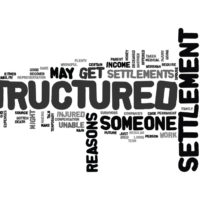STRUCTURED SETTLEMENTS CAN BE GOOD THINGS – UNDER THE RIGHT CIRCUMSTANCES

Structured settlements can be very good things – under the right circumstances. It’s important to understand how structured settlements get “structured” in the first place.
Many civil cases, including personal injury lawsuits, end up with the injured party agreeing to receive regular payments over a period of time (or sometimes for the rest of his or her life) in place of receiving a large amount of money in one lump sum.
Why is that a positive? Well, suppose the plaintiff has suffered life-changing physical and even mental damage due to the negligence of another party (a reckless driver, a company that did not properly service its equipment, a medical professional who made an avoidable error in diagnosis or procedure, a defective product irresponsibly sold by a manufacturer). The case, like many, many personal injury cases, never makes it to a jury trial in court. Instead, the insurance company of the defendant makes the offer to the injured party to pay a sum of money in cash.
By way of lending perspective to the discussion about structured settlements, according to The Law Dictionary, only 4-5% of personal injury cases in the United States ever go to trial; the vast majority of cases are settled. Another rather startling statistic is that 90% of cases that DO make it to court – end up losing!
So, yes, for individual plaintiffs, settlements can be a good thing. On the other hand, think about this: an injured individual with no experience managing large sums of money is certainly not in good enough physical or psychological shape to begin managing money now. With a structured settlement, a regular monthly income would be set up (typically through the purchase of an insurance company annuity), so that the plaintiff doesn’t need to shoulder the responsibility of choosing investments or managing large-scale finances.
How does this structured settlement arrangement actually work? The defendant’s insurance company, rather than paying out a large sum of money today, agrees to make guaranteed. periodic payments to the injured party. Obviously there are complex mathematical calculations to be made, and one of the aspects of our work at Ramey & Hailey involves negotiating the most advantageous terms for settlements on behalf of our injured clients.
In fact, accepting a series of payments rather than a lump sum is a very, very serious matter and there are many important factors to be weighed carefully:
- Under current tax law, there are certain parts of any settlement that can be taxed, such as any punitive damages and damages paid for purely emotional damage that do not stem from physical injury. Those tax considerations need to be factored into the decision to accept the settlement.
- There is a real danger that no matter how many expert calculations and predictions are done, inflation and unexpected costs will mean the monthly money might not be enough to cover actual expenses.
- If, at some point in the future, medical science discovers a miracle cure, there is the fear that the plaintiff will not have access to a large enough sum of money to pay for the treatment.
- If an individual is receiving Medicare payments, it is important that the income from a structured settlement payout not affect those payments.
- The payments from a structured settlement will be coming from a life insurance company and will be tied to the financial stability of the insurer.
Even before discussing all these possibilities, choices, and pros and cons with each client, as personal injury attorneys, we have an enormous amount of work to do on their behalf in terms of “discovery”. That process will include:
- taking depositions
- interviewing witnesses
- consulting with medical professionals
- consulting with financial and tax professionals
- estimating and calculating costs that occur while waiting to go to trial
- negotiating the terms of the settlement
Many personal injury cases culminate in a settlement, and many settlements take the “structured” form of periodic payments. As Robert W. Wood observes, “Structured settlements are tax-efficient and have spendthrift advantages too…They aren’t for everyone, “Woods cautions, you shouldn’t structure every nickel you receive. Once they are set up, they generally can’t be changed.”
At Ramey & Hailey, our view is that, like all tools, structured settlements can be good things – under the right circumstances!




